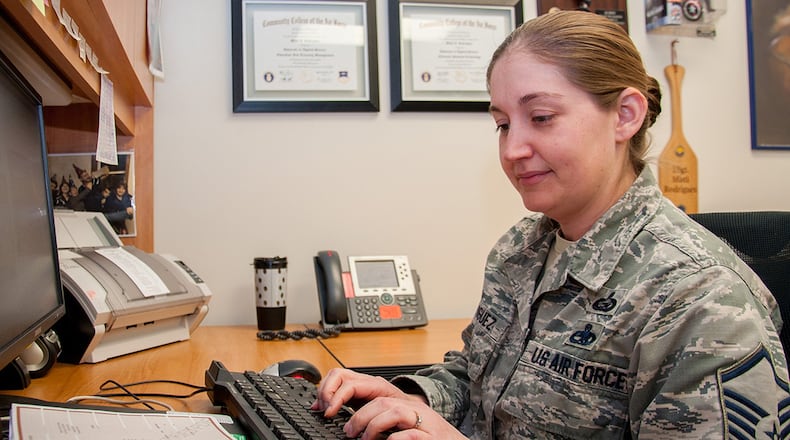Even active-duty officer academic records are only masked up until the colonel board, in which case a master’s degree must be in the officer’s official record.
It may surprise some that two Airmen at the AFIT Academic Coding Branch are responsible for updating the records of around 130,000 total force Air Force officers, including active-duty, guard and reserve. They receive about 20,000 transcripts annually for bachelor’s, master’s, doctorate and professional degrees, and each one is entered by hand.
“Yes, I absolutely enjoy what I do. I love my job here,” said Tech. Sgt. Jennifer Warehime, ACB NCO-in-charge. “It’s interesting and even though we do the same thing day-to-day, it differs from day-to-day. Whether it be with customers or different transcripts or with different degrees that I see, I learn things every single day.”
They see themselves providing not only a vital mission for individual officers but one that impacts the entire Air Force as well.
“[It’s important in order] for them to be assigned to the proper positions throughout their career progression,” said Master Sgt. Misti Rodriguez, ACB superintendent. “[We ensure] that their data entries are correct so that they can progress positively and the Air Force can find the person they’re looking for to meet its needs.”
The ACB is located at AFIT because that’s where the officer’s academic database has resided since its start, said LaBrie. But soon those files will merge with the Air Force enlisted academic degrees database located at Maxwell Air Force Base Gunter Annex in Montgomery, Alabama. While the ACB won’t be physically moving, once the data merge is complete officers should start receiving automated notifications once their records are updated – currently, officers must check the Virtual Military Personnel Flight from time to time until they see the change.
While processing large quantities of transcripts can be time consuming, Rodriguez says that the best thing that officers can do to speed up their updates is to closely follow submission instructions at the ACB’s website: www.afit.edu/CODING. That, and understand that all of the officer academic record updates for the entire Air Force comes down to a small, dedicated team.
“People don’t realize that it’s just the two of us,” Warehime said. “But, we actually do get a lot of emails thanking us for the quick response or for updating their data. It makes the job worth it.”
The Coding Branch suggests allowing two to three weeks for delivery and processing of traditional mail. The submitter will notice their update on the Career Data Brief in the vMPF within 24 hours of the processing. The AFIT Coding Branch cannot make real-time updates to Assignment Management System Single Unit Retrieval Format (SURF) or the Air Force Virtual Education Center and it can take up to 30 days for changes to update in those systems. If an individual would like delivery confirmation of their materials, they should use certified mail or another tracked delivery method. Visit the ACB website for more details.
How does an officer get his or her academic records updated?
The member must request an official transcript be mailed or emailed to the ACB. Electronic transcripts can be emailed directly from the university to afit.msp.transcripts@us.af.mil and the mailing address is:
AFIT Academic Coding Branch
2950 Hobson Way
WPAFB OH, 45433-7765
This office will not accept diplomas, photocopies, screenshots, enrollment verifications, letters of degree completion, etc. If the member has an unopened transcript, it can be mailed to the address above.
About the Author
